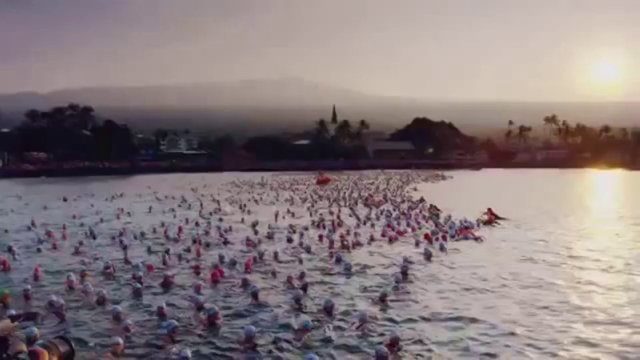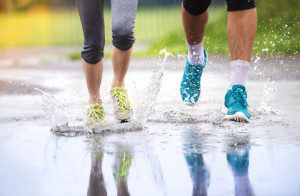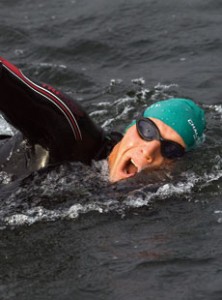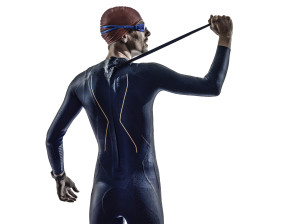Top 10 first triathlon fears

Is your first triathlon coming up? Here are some of the most common fears for first time triathletes and some tips to help you get over them
 1) What if the weather is bad?
1) What if the weather is bad?
It’s a good idea to train in all possible weather conditions that you could encounter on race day. If you save your training for ideal temperatures, you’re robbing yourself of the opportunity to learn to race well no matter what. Most races will still run even if it’s raining. If weather conditions do prevent open water swimming, a triathlon will often be turned into a duathlon.
2) What if I have an equipment malfunction?
Don’t leave your final equipment check until the night before your race. Train in the outfit you’ll be racing in to make sure it’s not uncomfortable for the race distance. If you plan on having your bike tuned up before your race, aim for two weeks prior. You’ll want to put some mileage on it afterward to make sure everything runs smoothly. Bring a tool kit to the race with you and know how to make any minor adjustments yourself.
If possible, pack doubles. Having a spare pair of goggles or extra battery for your bike computer will come in handy.
3) What if I don’t make the swim cut-off?
The swim causes anxiety for lots of triathletes. If you’re worried about making the swim time cut-off, make sure you get
 enough open water swim workouts in during the weeks prior. Pool training is great for working on your speed but getting in open water is the best simulation for race day. Training with partners will help you get used to swimming alongside others when there are no lanes as separation.
enough open water swim workouts in during the weeks prior. Pool training is great for working on your speed but getting in open water is the best simulation for race day. Training with partners will help you get used to swimming alongside others when there are no lanes as separation.
4) What if I get a flat tire on the bike course?
It’s important to be prepared for anything on race day. If you’ve never changed your own flat tire before, it’s never too late to learn. Most bike shops offer free clinics to teach you how and give you the chance to try it yourself. The more you practice, the more comfortable you’ll feel in case you do get a flat on race day. It’s a good idea to carry more than one spare tube with you during your race just in case.
5) What if I can’t wear my wetsuit on race day?
Many races ban wetsuits on race day if the water is above a certain temperature. This  doesn’t mean that they won’t allow you in the water with your wetsuit. It means that if you choose to wear a legal wetsuit, you won’t be eligible for awards and Championship slots and you’ll get an official DQ on the race results.
doesn’t mean that they won’t allow you in the water with your wetsuit. It means that if you choose to wear a legal wetsuit, you won’t be eligible for awards and Championship slots and you’ll get an official DQ on the race results.
If your event decides to prohibit wetsuits, be prepared to race in just your triathlon suit or swimwear. This will have a different feel in the water, since a wetsuit provides plenty of buoyancy. Get in some swim practice wearing your race day attire so you know what to expect when you get in the water.
6) What if I can’t settle into a rhythm?
Staying calm is the key to finding your rhythm. Prepare yourself for what to expect by watching a similar race either in person or online. During the swim, counting steadily between breaths can help to find your rhythm. Plan realistic pacing on the bike and run. If you use a computer or watch to help you to monitor yourself during training, you may find that during your race you have more confidence because you know what you’re capable of and whether you’re sticking to it.
7) What if I cramp up?
There are several measures you can take to avoid cramping. Drinking pickle juice before the race is a little-known secret for preventing cramps. Be sure to keep up sodium, electrolyte and hydration levels. Stop and stretch if you feel a  cramp coming on. Stopping may seem counterproductive, but taking time to overcome discomfort will make the rest of your race much smoother.
cramp coming on. Stopping may seem counterproductive, but taking time to overcome discomfort will make the rest of your race much smoother.
Learn what race day aid stations will be available along the course. It will be invigorating to know that some extra hydration and encouraging volunteers are waiting for you just around the corner.
8) What if I need to take a break?
It’s perfectly normal to give yourself a break in any of the three legs of the race. Many athletes walk portions of the run and still finish in respectable times. Take some extra time in transition zones if you feel like you need a break during the race. These areas are great spots to reconnect with friends and family along the sidelines. Seeing a familiar face might be all you need to get back out there.
9) I missed a few workouts in my training. Am I ready?
If you’ve missed a few workouts to take some extra rest days you may actually benefit during your race. Sleep and recovery go hand-in-hand and sometimes it’s better to relax instead of up the intensity. It’s natural to feel nervous and doubt yourself, especially before your first race. Trust yourself and the work you’ve put in.
10) What if I finish last?
In every race, someone has to finish last. Whether you’re the last one out of the water, off the bike, or to cross the finish line, you’re no less of an athlete. Be realistic about what to expect from yourself on race day. If you know your finishing time will be somewhere around the final time cut-off, remember that won’t always be the case. Finally, there are always people who don’t finish at all and even more who don’t bother to start. You’re impressive for making it to the finish line, regardless of how long it takes.

